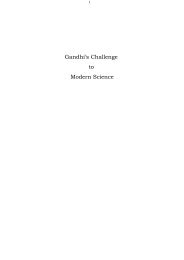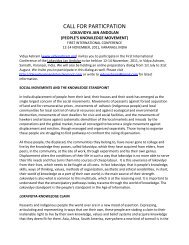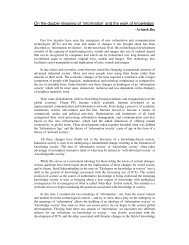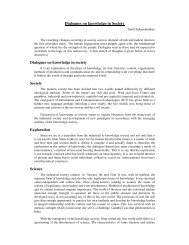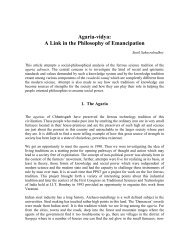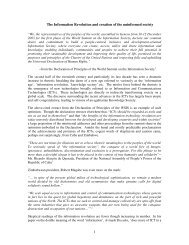Create successful ePaper yourself
Turn your PDF publications into a flip-book with our unique Google optimized e-Paper software.
<strong>Vidya</strong> <strong>Ashram</strong><br />
First Annual Report 2005-06.<br />
<strong>Vidya</strong> <strong>Ashram</strong> has been functioning for over a year now. A group of friends who had<br />
been working together in and around Varanasi for several years got the <strong>Ashram</strong><br />
registered as a Trust in March 2005. In November 2005, <strong>Vidya</strong> <strong>Ashram</strong> was able to<br />
acquire the 'Buddha Kuti' premises in Sarnath. This purchase was made possible by the<br />
help and donations given by friends (see Appendix 1). These friends are prinicipally<br />
those who contributed financially and intellectually from the very beginning, for<br />
organised efforts in Varanasi in the social and Lokavidya sphere..<br />
I) BEGINNING<br />
In November 1998, the Third Congress on Traditional Sciences and Technologies of<br />
India took place in Varanasi. This event, also known as the Lokavidya Mahadhiveshan,<br />
was jointly organised by the Patriotic and People Oriented Science and Technology<br />
Foundation (PPST), Chennai, Mazdoor Kisan Niti group (originally from Kanpur), and<br />
Nari Hastakala Udyog Samiti, Varanansi, and was conducted at the Gandhian Institute of<br />
Studies, Varanasi.<br />
During the preparatory work done for the Lokavidya Mahadhiveshan among social<br />
activists, intellectuals, women, artisans, farmers and adivasis, there emerged a group that<br />
was motivated to work along the idea of lokavidya. Both this group, and the idea of<br />
lokavidya, continued to gain further strength through the publication of Lokavidya<br />
Samvad. The understanding also gained strength that the realm of vidya is awaiting a<br />
popular revolution. Without such a revolution, neither a new politics, nor a humane<br />
society can be reconstructed.<br />
In January 2004, the massive World Social Forum was organised in Mumbai. Participants<br />
from all over the world came forward to participate in our workshop "Dialogue on<br />
Knowledge in Society". The group engaged in Knowledge Dialogues came together with<br />
renewed energy, and preliminary thinking about setting up of a '<strong>Vidya</strong> <strong>Ashram</strong>' began.<br />
In June 2004, a meeting took place in Sarnath, where friends from Uttar Pradesh, Bihar,<br />
Maharashtra, and Delhi participated. This meeting of approximately 15 activists<br />
(Appendix 2) resulted in the decision to construct the <strong>Vidya</strong> <strong>Ashram</strong> in Sarnath. On 1st<br />
August 2004, <strong>Vidya</strong> <strong>Ashram</strong> started functioning from its present premises.<br />
II) IDEA<br />
<strong>Vidya</strong> <strong>Ashram</strong> is an attempt to bring about a pivotal change in social sphere of vidya, an<br />
attempt to revitalise vidya in society. There is never a paucity of vidya in society, but<br />
societal structures, patterns of governance, and domains of organised knowledge do aid<br />
or impede the progress of vidya in society. Ordinary people keep enriching the vidya<br />
existing in society on the basis of their needs, experiences, philosophy, and logic. The<br />
University and the structures of organised-religion, refuse to recognise this vidya present<br />
in society, indeed they disrespect it and even conspire against it. It is therefore necessary<br />
that vidya be liberated from being imprisoned by the University or by organised-religion,<br />
1
so that it can work for the processes of construction and reconstruction of truth for the<br />
benefit of ordinary people.<br />
The processes of monetisation and internationalisation unleashed via globalisation, the<br />
development of Internet, and the American wars have served to hurl into a void all those<br />
who think seriously about society and social issues. Politics and education have both<br />
become unipolar. Those wishing to stand at the pole of public good are left discouraged.<br />
Farmers, workers, artisans, and lower-middle class families are the biggest victims of<br />
such change. The loss of jobs, the demolition of living spaces, the destruction of small<br />
businesses, and the despair of farmers; behind all these lie the painful life-stories of<br />
millions of families. In this scenario, the prevalent politics, organised-religion, or the<br />
University do not seem to be in a position to fulfill an even distantly beneficial role.<br />
It is necessary to emerge out of the web of deceit of organised-religion. The myth that<br />
universities are locales of vidya needs to be shattered. It is important to understand that<br />
the virtual society being created by the Internet is the new locale of knowledge, and that<br />
this locale is going to be even more divorced from ordinary people, their experiences,<br />
their needs, and their modes of thinking. In this changing world, the vidya among the<br />
people demands a fresh invigoration. <strong>Vidya</strong> <strong>Ashram</strong> considers itself to be a part of the<br />
currents that fulfill this social need.<br />
The ideals of <strong>Vidya</strong> <strong>Ashram</strong> lie in lokavidya and in ordinary life. We are votaries of the<br />
natural knowledge, natural thinking, and natural living emanating from the traditions of<br />
Buddha, Kabir, and Gandhi. Spiritual practice doesn't require the renunciation of food<br />
and water. The ideal life doesn't require renunciation of ordinary life, or renunciation of<br />
everyday duties. Monasticism is not what is required for inner growth; living amidst<br />
ordinary people is what is. Sadhana, ordinary life, contact with the people, and dialogue<br />
on vidya - these are the lifeblood of the <strong>Ashram</strong>. Support to the idea of change through<br />
people’s initiative and people’s struggles makes vidya earthy and its dynamic real.<br />
The attempt in the shape of <strong>Vidya</strong> <strong>Ashram</strong> has been to create a space and atmosphere<br />
where people with varied endowments of life and thought keep coming. They come to<br />
participate in the dialogues here, to enrich them with their own ideas, and to learn from<br />
them. Farmers, artisans, their families, litterateurs, artists, scientists, linguists and social<br />
activists, all come here . Through extensive participation in the dialogues on vidya, the<br />
attempt is to reconstitute the role of various paths and standpoints on of vidya in human<br />
life and in social change.<br />
III) WORK<br />
The <strong>Ashram</strong> doesn't wish to make a distinction between ideas and work. We wish to<br />
initiate a dialogue on vidya, and on vidya in society, among farmers, artisans, women,<br />
tribals, artists, social activists, scientists, and intellectuals. All are equal participants in<br />
this debate; equal in their epistemic prowess.<br />
The lives, problems, oppressions of ordinary people, and their sources of strength are the<br />
subject of this dialogue on vidya, as is philosophy, science, art and literature, and<br />
language.<br />
The loci of this dialogue are all those areas where the expectation of change is taking<br />
shape: education, literature and art, media, international law, the web of information, etc.<br />
2
Also appropriate loci for this dialogue on vidya are the struggles over markets,<br />
production, and living spaces that the poor and oppressed are waging.<br />
The struggles and movements for change have a strong and long-term relation with the<br />
dialogue on vidya. While on the one hand the dialogue on vidya has the capacity to help<br />
attain clarity on how these movements can be sustained in the long run, on the other hand<br />
the dialogue itself is enriched and vidya develops a people oriented dynamic by being<br />
situated amidst such movements and struggles.<br />
IV) ACTIVITIES<br />
1) Lokavidya Samvad: Through this periodical, a knowledge dialogue is conducted in the<br />
Hindi-speaking areas, on public, social, and political issues. The ongoing transformation<br />
of the industrial world into the world of information and communication technology<br />
provides the principal context in which this dialogue is situated.<br />
Since 1998, 17 issues have been published. Of these, since 2005, 3 issues have been<br />
published from <strong>Vidya</strong> <strong>Ashram</strong>.<br />
2) Knowledge Dialogue (English & Hindi): This began in the form of the workshop<br />
titled Dialogues on Knowledge in Society that was organised at the World Social Forum,<br />
Mumbai; the (nine) presentations made at the workshop were also published in booklet<br />
form. These dialogues have focussed on those questions that the world of Internet and<br />
Computer technology are throwing up - patenting, media, philosophy of science, all find<br />
place in this dialogue. We attempt to put forward the lokavidya standpoint in these<br />
dialogues and foreground the aspect of public good. Such knowlege dialogue has been<br />
initiated in the following institutions and cities:<br />
Varanasi - <strong>Vidya</strong> <strong>Ashram</strong>, Sarnath; Theosophical Society, Kamaccha;Tulsi<br />
Pustakalaya, Bhadaini.<br />
Nagpur - Rashtrabhasha Sansthan, Mor Bhavan.<br />
Indore - Abhyas Mandal, Town Hall.<br />
Delhi - Centre for Study of Developing Societies, Rajpur Road.<br />
Kanpur - I.I.T. Kanpur<br />
Mumbai - I.I.T. Mumbai<br />
Hyderabad - University of Hyderabad; Central Institute of English and Foreign<br />
Languages.<br />
Bangalore - National Institute of Advanced Studies, I.I.Sc.<br />
Chennai - K.B.C. Centre for Electronics, Anna University.<br />
At the Karachi World Social Forum in March 2006, a workshop on 'Virtuality and<br />
Knowledge in Society' was organised as part of the Dialogues on Knowledge in Society.<br />
Abstracts of the 10 papers that were sent in for the workshop were distributed in booklet<br />
form.<br />
3) Kisan Peeth: This is a forum for discussion on ongoing contemporary changes<br />
(informatisation - globalisation) in view of the wellbeing of farmers. So far 'Farmer-<br />
Market Relationship' and 'Seeds' have been the prinicipal areas of focus of discussions in<br />
this forum. And the following activities have been taken in hand so far:<br />
3
Collective as well as individual discussions have taken place so far with farmers<br />
from about 25 villages around Sarnath. Of these, the discussions that took place<br />
in Salaarpur, Babhanpura, Chaandpur, Deenapur, Chireigaon, Chhaanhi,<br />
Hridayapur, and Sultanipur were particularly significant.<br />
Detailed work was done on vegetable markets, vegetable seeds, and vegetable<br />
farmers.<br />
Two large meetings on markets, seeds, and farmers were organised at <strong>Vidya</strong><br />
<strong>Ashram</strong> (in February 05 and May 06) with the participation of farmers, leaders of<br />
their movements, and social activists, of Varanasi, Chandauli, Ghazipur,<br />
Mirzapur, Azamgarh, and Ballia.<br />
Two bulletins of Kisan Peeth were published (June 05 and May 06).<br />
4) Kala Sadhana: In the <strong>Ashram</strong>'s view, kala (art) is an essential part of vidya. This is<br />
that form of vidya with which the ordinary person relates easily. Because it is motivated<br />
by sensibilities, a certain morality inheres in it. Activity centred around art has been made<br />
an important programme of the <strong>Ashram</strong>. The following activities were taken up during<br />
the year:<br />
Training in visual art and music for boys and girls through evening classes.<br />
Drawing/painting competitions were organised among students of local schools.<br />
Musical Programmes featuring singers from nearby villages were organised<br />
(February 05, August 05, October 05, December 05).<br />
A Poetry Confluence was organised around the topic "Village Youth & their State<br />
/ Directions" with the help of Shri Gandhi Inter College of Gaura Village. In this,<br />
7 poets from villages, and 7 poets from the city participated (October 05).<br />
Recitations and discussions of poetry were organised at <strong>Vidya</strong> <strong>Ashram</strong> (February<br />
05 and November 05).<br />
Extensive discussions were held with Hindi litterateurs. On the basis of these, the<br />
Literature special-issue of Lokavidya Samvad was published (Issue 17, February<br />
06).<br />
Discussions and meetings were organised with those with expertise in the Arts<br />
(November 05, December 05).<br />
5) Society and Education: It has been a continuing concern to construct programmes<br />
that would help raise the level of knowledge of village children and youth of the areas<br />
4
around Sarnath. As moves in this direction, a short-term study scheme, a progam for<br />
learning Asian languages and a small library was attempted to be started .<br />
The short term study scheme was supposed to attract those young men and<br />
women who would have liked to spend a few months at the <strong>Ashram</strong> to think ,<br />
dialogue and write on issues of their interest in philosophy, art , technology or<br />
society. So far one student has dabbled in Buddhist Philosophy in this scheme.<br />
In the program of Asian Languages some <strong>Ashram</strong>ites begane learning Urdu.<br />
Special attempt was made to include in the library books written in Hindi.<br />
Particular effort was made to collect literature connected with the social changes<br />
coming about as a result of globalisation, spread of computer-Internet, and<br />
media. There has of course also been an attempt to collect information about the<br />
communities that are possessors of lokavidya.<br />
6) Dialogues at the <strong>Ashram</strong>: The <strong>Ashram</strong> perceives each person as embodied with<br />
vidya. Farmers, artisans, women, adivasis, intellectuals, experts, spiritual aspirants,<br />
monastics, all are knowledgeable beings. All those living amidst the currents of particular<br />
traditions are possessors of knowledge. In the Knowledge Dialogues, <strong>Vidya</strong> <strong>Ashram</strong><br />
insists upon the epistemic equality of various knowledge traditions. Right from the<br />
inception of the <strong>Ashram</strong>, there has been a stream of visitors representing various<br />
knowledge traditions, who have come to stay and conduct dialogue. Farmers, workers,<br />
artisans, teachers, monastics, students - all have been coming here. Also visiting and<br />
enlivening the atmosphere of dialogue at the <strong>Ashram</strong> have been activists connected with<br />
various people's movements: Azadi Bachao Andolan, Bharatiya Kisan Union, Samajwadi<br />
Jan Parishad, Janwadi Lekhak Sangh, Yuva Bharat, Sangharsh Vahini, Lok Chetna<br />
Samiti , Prerana Kala Manch , NAPM etc. Artistes and thinkers associated with<br />
education, literature, music, cinema, and media have also contributed to these knowledge<br />
dialogues. From within Varanasi, intellectuals, scholars and students from various<br />
institutions have participated in these dialogues: Gandhian Institute of Studies, Kashi<br />
<strong>Vidya</strong>peeth, U.P. College, Central Institute of Higher Tibetan Studies, Benares Hindu<br />
University, Theosophical Society, etc. Individuals/groups from abroad have also<br />
participated; a 25-member team of the International Futures Forum from Scotland visited<br />
<strong>Vidya</strong> <strong>Ashram</strong> and participated in a knowledge dialogue, which also saw the participation<br />
of intellectuals and activists from various institutions of Varanasi.<br />
Efforts were also made to have regular discussion sessions at the <strong>Ashram</strong>, in which<br />
questions related to society, vidya and education figured prominently.<br />
7) Participation in Social Struggles/Movements: Members of the <strong>Ashram</strong> participated<br />
in the following struggles/movements:<br />
Farmers' movements/struggles<br />
The anti Pepsi-Coke movement<br />
Indo-Pakistan Peace March<br />
Peace March during the communal riots in Mau<br />
Agitation against the raising of the Sardar Sarovar Dam<br />
5
8) Campus: Most of the members of the <strong>Ashram</strong> stay on campus (Appendix 3). There<br />
are some rooms for staying. The <strong>Ashram</strong> kitchen provides meals that are eaten together.<br />
There is an office that is open during the daytime. For the office, and for purposes of<br />
reading-writing, computer and Internet facility are available. There is a small library. The<br />
campus is spacious and open, with space where the members cultivate vegetables. The<br />
campus already had old trees of Mango, Jamun, Amrood, Kathal, Ber, Custard Apple,<br />
Lemon, Pomegrenate, Kadamb, Eucalyptus. We have planted a neem tree.<br />
6
Appendix – 1<br />
Contributors and Supporters<br />
Name City/Town<br />
1 Dr Vijay Joshi Chennai<br />
2 Dr Ashok Jhunjhunwala Chennai<br />
3 Dr C.N. Krishnan Chennai<br />
4 Shrimati Rajlakshmi Chennai<br />
5 Dr J.K. Suresh Bangalore<br />
6 Dr G. Sivarama Krishnan Bangalore<br />
7 Dr Abhijit Mitra Hyderabad<br />
8 Dr Naresh Sharma<br />
Hyderabad<br />
9 Dr. B. Krishnarajulu<br />
Hyderabad<br />
10 Dr Girish Sahasrabudhey Nagpur<br />
11 Dr K.K. Surendran Pune<br />
12 Shri Avinash Jha Delhi<br />
13 Dr Chandra Prakash Singh U.S.A.<br />
14 Dr Amit Basole U.S.A.<br />
15 Dr Chitra Sahasrabudhey Varanasi<br />
16 Shri Vinish Gupta Varanasi<br />
17 Shri Sunil Sahasrabudhey Varanasi<br />
7
Appendix – 2<br />
Members present in the Sarnath Meeting in June 2004<br />
Name City/Town<br />
1 Dr K.K. Surendran Pune<br />
2 Dr Girish Sahasrabudhey Nagpur<br />
3 Dr Vijay Chariar Kharagpur<br />
4 Shri Avinash Jha Delhi<br />
5 Dr Ravindra Pathak Gaya<br />
6 Dr Pramila Pathak Gaya<br />
7 Shri Rajvallabh Gaya<br />
8 Dr Krishna Gandhi Jhansi<br />
9 Shri Ramadhar Giri Chandauli<br />
10 Shri Arun Kumar Varanasi<br />
11 Shri Tenzin Rigzin Varanasi<br />
12 Shri Rupesh Varanasi<br />
13 Mohammed Aleem Hashmi Varanasi<br />
14 Shri Vinod Kumar Chaubey Varanasi<br />
15 Shri Lakshman Prasad Maurya Varanasi<br />
16 Parvez Aslam Hashmi Varanasi<br />
17 Shrimati Chitra Sahasrabudhey Varanasi<br />
18 Shri Sunil Sahasrabudhey Varanasi<br />
Arun Kumar ( Delhi ) , Ananya Vajpeyi (Delhi ) , Amit Basole ( USA ) , Krishnarajulu<br />
( Hyderabad) , and Naresh Sharma ( Hyderabad ) could not come for the meeting but<br />
communicated their support for the decision to build <strong>Vidya</strong> <strong>Ashram</strong>.<br />
On the second day there was dialogue with the President of Varanasi Division of<br />
Bharatiya Kisan Union Shri jagadish Singh Yadav and his comreds.<br />
8
The list of people who visited the <strong>Vidya</strong> <strong>Ashram</strong><br />
Name Work/Occupation<br />
1 Shri Ramadhar Giri Social Thinker and Veteran Activist<br />
2 Shri Jagdish Singh Yadav President, Bharatiya Kisan Union, Varanasi Mandal<br />
3 Shri Shama Prasad Singh Thinker, Leader and Activist<br />
4 Shri Dinanath Shrivastava Thinker and Leader of Farmers’ Movement<br />
5 Shri Ramjanam Yadav Social Activist<br />
6 Shri Tenzin Wangchuk Student<br />
7 Shri Yeshi Wandue Student<br />
8 Swami Sacchidanand Hari Monastic from Ambala<br />
9 Shri Arvind Murty Social Activist and Thinker<br />
10 Shri Vallabh Active in the area of Education<br />
11 Shri Arun Kumar Social Activist and Thinker<br />
12 Shri Mansur Ali Khan Cinema Director<br />
13 Shri Vivek Umrao Engineer<br />
14 Dr Ramsudhar Singh U.P. College, Varanasi<br />
15 Dr Rahul Burman I.I.T. Kanpur<br />
16 Shri S.S. Modi<br />
17 Shri Mahendra Singh & wife Jeevan <strong>Vidya</strong>, Somaiya College, Mumbai.<br />
18 Shri Ranjan De Independent Educator<br />
19 Shri Ashok Singh Writer, Social Activist<br />
20 Shri Gyanendra Pati Hindi Poet<br />
21 Shri Praveen Singh Jeevan <strong>Vidya</strong> Proponent<br />
22 Shri Pawan Gupta Director, SIDH, Mussoorie<br />
23 Shri Rupesh Social Activist<br />
24 Shri Ashok Kumar Dubey Artist<br />
25 Shri Bhuvan Pathak & friend Social Activist<br />
26 Shri Sanjay Activist, Azadi Bachao Andolan<br />
27 Shri Ravindra Pathak &<br />
Rajvallabh<br />
28 Shri Praval Singh Engineer<br />
29 Shri Ravi Gulati & companion Educator, ‘Manzil’, Delhi.<br />
30 Shri Om Tyagi Leftist group, Kanpur<br />
31 Shri Virendra Shrivastava<br />
32 Shri Gopal Krishnan Social Activist, Faizabad<br />
33 Shri Vijay Kundaji Computer Engineer, Bangalore<br />
34 Iuliana Computer Engineer, Romania<br />
35 Shri Avinash Jha & sister C.S.D.S., Delhi<br />
36 Shri Murali Computer Engineer, Bangalore<br />
37 Shri Arthur Peace & Education Researcher, U.S.A.<br />
9
1 Smt Chameli Devi<br />
2 Shri Lal Babu<br />
3 Shri Mohammed Aleem Hashmi<br />
4 Akbari Begum (w/o Md. Aleem)<br />
5 Firdaus Bano (d/o Md. Aleem)<br />
6 Kulsoom Bano (d/o Md. Aleem)<br />
7 Shri Vinod Kumar Chaubey<br />
8 Arpita Chaubey (d/o Vinod Chaubey)<br />
9 Shri Sunil Sahasrabudhey<br />
10 Smt Chitra Sahasrabudhey<br />
11 Shri Parvez Aslam Hashmi<br />
12 Shri Dilip Singh ‘Dili’<br />
13<br />
14<br />
15<br />
Shri Vinish Gupta<br />
Shri Laxman Prasad Maurya<br />
Shri Anirvan Das<br />
16 Shri Gharbharan Yadav<br />
17 Shri Rajit Singh<br />
18 Shri Ajit Rai<br />
Appendix - 3<br />
(<strong>Ashram</strong>ites)<br />
Shri Ram Anchal Varma (Music Teacher)<br />
Shri Amarnath Tiwari (Music Teacher)<br />
Shri Kameshwar Joshi ( Drawing Teacher)<br />
Shri Ashok Dube (Artist , a painter)<br />
Moh. ( Urdu Teacher )<br />
10




